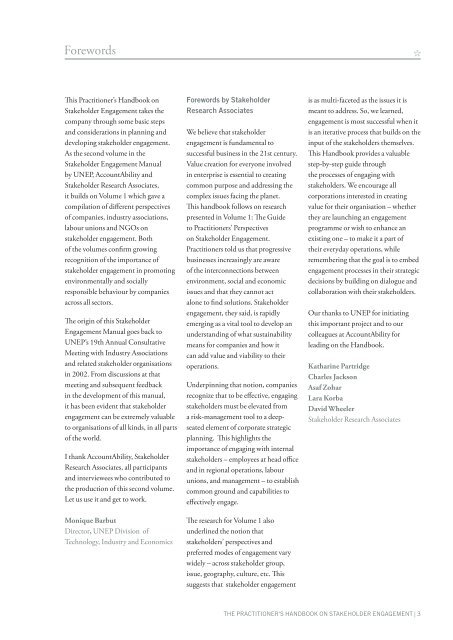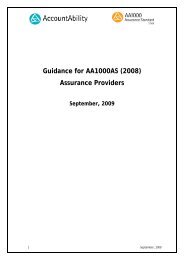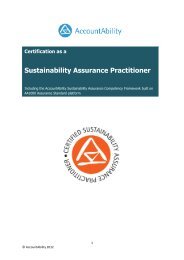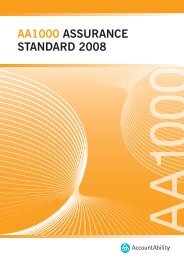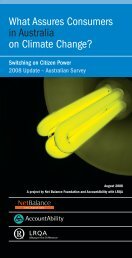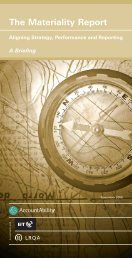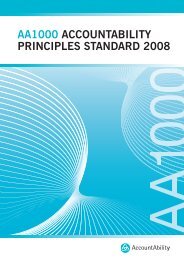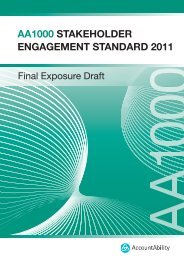The Stakeholder Engagement Manual Volume 2 - AccountAbility
The Stakeholder Engagement Manual Volume 2 - AccountAbility
The Stakeholder Engagement Manual Volume 2 - AccountAbility
You also want an ePaper? Increase the reach of your titles
YUMPU automatically turns print PDFs into web optimized ePapers that Google loves.
Forewords<br />
Th is Practitioner’s Handbook on<br />
<strong>Stakeholder</strong> <strong>Engagement</strong> takes the<br />
company through some basic steps<br />
and considerations in planning and<br />
developing stakeholder engagement.<br />
As the second volume in the<br />
<strong>Stakeholder</strong> <strong>Engagement</strong> <strong>Manual</strong><br />
by UNEP, <strong>AccountAbility</strong> and<br />
<strong>Stakeholder</strong> Research Associates,<br />
it builds on <strong>Volume</strong> 1 which gave a<br />
compilation of diff erent perspectives<br />
of companies, industry associations,<br />
labour unions and NGOs on<br />
stakeholder engagement. Both<br />
of the volumes confi rm growing<br />
recognition of the importance of<br />
stakeholder engagement in promoting<br />
environmentally and socially<br />
responsible behaviour by companies<br />
across all sectors.<br />
Th e origin of this <strong>Stakeholder</strong><br />
<strong>Engagement</strong> <strong>Manual</strong> goes back to<br />
UNEP’s 19th Annual Consultative<br />
Meeting with Industry Associations<br />
and related stakeholder organisations<br />
in 2002. From discussions at that<br />
meeting and subsequent feedback<br />
in the development of this manual,<br />
it has been evident that stakeholder<br />
engagement can be extremely valuable<br />
to organisations of all kinds, in all parts<br />
of the world.<br />
I thank <strong>AccountAbility</strong>, <strong>Stakeholder</strong><br />
Research Associates, all participants<br />
and interviewees who contributed to<br />
the production of this second volume.<br />
Let us use it and get to work.<br />
Monique Barbut<br />
Director, UNEP Division of<br />
Technology, Industry and Economics<br />
Forewords by <strong>Stakeholder</strong><br />
Research Associates<br />
We believe that stakeholder<br />
engagement is fundamental to<br />
successful business in the 21st century.<br />
Value creation for everyone involved<br />
in enterprise is essential to creating<br />
common purpose and addressing the<br />
complex issues facing the planet.<br />
Th is handbook follows on research<br />
presented in <strong>Volume</strong> 1: Th e Guide<br />
to Practitioners’ Perspectives<br />
on <strong>Stakeholder</strong> <strong>Engagement</strong>.<br />
Practitioners told us that progressive<br />
businesses increasingly are aware<br />
of the interconnections between<br />
environment, social and economic<br />
issues and that they cannot act<br />
alone to fi nd solutions. <strong>Stakeholder</strong><br />
engagement, they said, is rapidly<br />
emerging as a vital tool to develop an<br />
understanding of what sustainability<br />
means for companies and how it<br />
can add value and viability to their<br />
operations.<br />
Underpinning that notion, companies<br />
recognize that to be eff ective, engaging<br />
stakeholders must be elevated from<br />
a risk-management tool to a deepseated<br />
element of corporate strategic<br />
planning. Th is highlights the<br />
importance of engaging with internal<br />
stakeholders – employees at head offi ce<br />
and in regional operations, labour<br />
unions, and management – to establish<br />
common ground and capabilities to<br />
eff ectively engage.<br />
Th e research for <strong>Volume</strong> 1 also<br />
underlined the notion that<br />
stakeholders’ perspectives and<br />
preferred modes of engagement vary<br />
widely – across stakeholder group,<br />
issue, geography, culture, etc. Th is<br />
suggests that stakeholder engagement<br />
is as multi-faceted as the issues it is<br />
meant to address. So, we learned,<br />
engagement is most successful when it<br />
is an iterative process that builds on the<br />
input of the stakeholders themselves.<br />
Th is Handbook provides a valuable<br />
step-by-step guide through<br />
the processes of engaging with<br />
stakeholders. We encourage all<br />
corporations interested in creating<br />
value for their organisation – whether<br />
they are launching an engagement<br />
programme or wish to enhance an<br />
existing one – to make it a part of<br />
their everyday operations, while<br />
remembering that the goal is to embed<br />
engagement processes in their strategic<br />
decisions by building on dialogue and<br />
collaboration with their stakeholders.<br />
Our thanks to UNEP for initiating<br />
this important project and to our<br />
colleagues at <strong>AccountAbility</strong> for<br />
leading on the Handbook.<br />
Katharine Partridge<br />
Charles Jackson<br />
Asaf Zohar<br />
Lara Korba<br />
David Wheeler<br />
<strong>Stakeholder</strong> Research Associates<br />
THE PRACTITIONER'S HANDBOOK ON STAKEHOLDER ENGAGEMENT | 3


